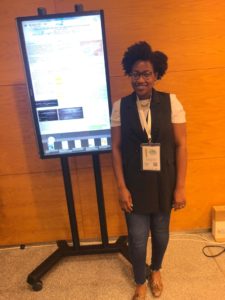Réka Cane, Fernanda Salvador and Ronise Silva, PhD students with financial support from GHTM or FCT scholarships, represented the GHTM/IHMT/ NOVA at Encontro da Ciência’22 with an e-poster.
This year, the event celebrates the 25th anniversary of the Fundação para a Ciência e Tecnologia and has Egipt as its guest country. Under the event’s motto “Building the Future with Science” and encouraged by the great Portuguese scientific event, GHTM PhD students presented their work and shared the results achieved so far with the scientific community.
Réka Cane conducted a transversal study on the prevalence of anaemia in children in Mozambique, aiming to estimate the prevalence of the disease and assess the association between structural determinants and haematological parameters in children aged six to 59 months. The preliminary results of the study, titled “Anemia em crianças dos seis aos 59 meses atendidas no Hospital Central de Maputo, Província da Cidade de Maputo, Moçambique“, showed that “24 to 59 month old, male and rural children are more prone to anaemia and therefore need to be further monitored during their growth”, explained the PhD student.
“Telemedicina no cuidado a doenças tropicais negligenciadas na comunidade de países de língua portuguesa: proposta para implementação de um protocolo assistencial de referência” is the title of the e-poster presented by Fernanda Salvador. According to the PhD student from the Department of Tropical Medicine and International/Global Health, this project is about “developing and demonstrating a protocol model for the use of telemedicine in Portuguese to support health services for neglected tropical diseases within the CPLP, from a global digital health collaboration perspective”.
“Low-density malaria infections: are they important to sustain malaria in Guinea-Bissau?” is the topic Ronise Silva is pursuing. In this study, the Vector-borne Diseases and Pathogens (VBD)-GHTM Research Group PhD student estimated the frequency of low-density malaria infections for different Plasmodium species in Guinea-Bissau. The results suggest that “active surveillance is needed to detect asymptomatic individuals, as they are a potential source of silent malaria transmission,” she explains.
Details of these projects can be found in the ‘Demonstrations and e-posters’ section of the Encontro Ciência’22 app. Participation is free, but registration is required. To view the programme and register, go to the website: www.encontrociencia.pt

